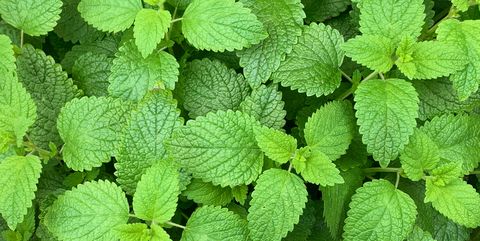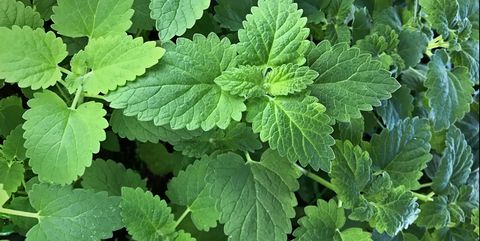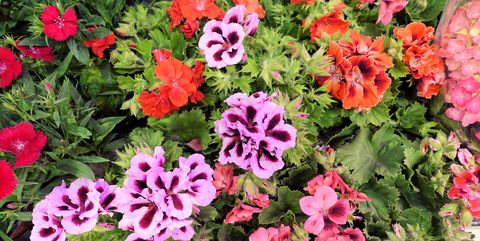Look, mosquitos are awful. They buzz in your ear, leave itchy red bites, and can even spread disease. No, thank you. The insects may be great food for birds and bats, but you definitely don’t want them hanging around your backyard (trust us, mosquito-borne diseases like West Nile virus, malaria, and Zika aren’t health issues you want to explore personally). Fortunately, there are a few ways to repel mosquitos naturally, without the use of sprays.
First, you’ll want to make your outdoor living areas less friendly to mosquito eggs by getting rid of any standing water (including the water in clogged rain gutters, birdbaths, and flower pots). You should also cut back any high grass or brush that creates cool, shady, or damp spots that mosquitos favor.
Alternately, you can use the power of scent to help you out. Certain strong smells can both hide the scent of people (something that attracts mosquitos) and prevent the bugs from wanting to get close enough to bite you. This is why DEET bug sprays and citronella candles sell like hotcakes in the summer. There are also several mosquito-repellent plants with strong scents that humans find pleasant and mosquitos hate. The aroma needs to be in the air around you, at the very least, but ideally on your skin.
To get the maximum effect of these natural mosquito repellent plants, crush herb leaves in your hands to release their perfume and essential oils, and then rub the leaves and their oils over your skin.
NOTE: Some of these plants may cause skin irritation. If you have dry or sensitive, you should avoid using them. You should not use if you are allergic to any of these plants, and you should always do a patch test on a small section of your skin before using.
Lemon Balm
This member of the mint family has white flowers and a gentle lemony scent, as well as some healing properties. Lemon balm is particularly good at keeping mosquitos away, but it’s also a fast grower, so be careful when planting it in your garden. It does well if you plant it in a pot on your patio, or other outdoor areas.
Catnip
This fragrant mint cousin contains a natural chemical called nepetalactone, which is both a feline attractant and a useful insect repellent. Though if you’re not interested in a bunch of cats moving into the area, skip this one and move onto a different plant.
Basil
A 2009 study showed that the essential oil from this delicious staple from your indoor herb garden is toxic to mosquito larvae. Grow this amazing plant around any natural water sources, such as a pond, and it may control the rate of eggs being laid.
Lavender
Lavender can repel flying insects like mosquitos, moths, and flies. The flower’s perfume is well-known, and while it will scent the air, the most effective way to use it for pest control is to rub the plant on your skin to release its oils.
Peppermint
In its concentrated form, peppermint is sometimes used as an insect repellent, and its oil has been shown to repel the adults and kill the larvae and eggs of several species.
Citrosum (a.k.a. Mosquito Plant)
This perennial is actually marketed as a “mosquito plant,” and sometimes referred to as the citronella plant primarily due to its strong citronella scent. Unfortunately, though it’s the most heavily marketed, there’s some research that suggests it’s also the least effective garden plant at mosquito control. Still, there are some benefits to be had from rubbing the crushed leaves on your skin, and if there’s nothing else around, it will provide some protection.
Sage and Rosemary
If you’re planning to gather around a fire, try burning a little sage or rosemary. The incense these plants give off when they burn not only smells good but is unpleasant enough to most species of insects that it’ll repel them — as long as you’re near the smoke.







